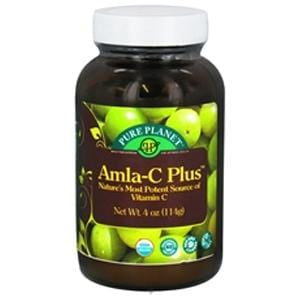
Pure Planet Amla C Plus - 4 oz. Powder
Regular price
$19.75
$15.75
Sale
- Immune enhancing benefits
- Antioxidant
- No GMOs, fillers, sweeteners or additives
- Potent Source of Vitamin C
- General Health Tonic
- Supports Liver and Kidney detoxification and function
There is no better source of natural vitamin C, with its’ full spectrum of bioflavonoids and supporting nutrients than amla berry. Also known as the Indian Gooseberry, the amla berry has been revered in Ayurvedic medicine since the 7th century for its’ anti-aging and immune-enhancing benefits and as a general tonic for optimal health. Mother Nature’s very best source of vitamin C, amla berries are well documented as much easier to assimilate than synthetic vitamin C, which is known as ascorbic acid. Vitamins from an all-natural whole-food source like amla are also safer and more effective than laboratory-created synthetic or crystalline vitamins, which may be derived from genetically engineered ingredients.
Whole-food Amla C Plus is more potent and thoroughly assimilated than synthetic supplements. As a wonderful antioxidant, alma aids the body’s natural defenses against bacteria and viruses, and even supports digestion. A unique blend of 80% amla berry and 20% Spirulina, Pure Planet Amla-C Plus has no GMOs, fillers, sweeteners or additives. No other vitamin C can make the same claim.
Directions: Pure Planet Amla C Plus comes in both tablet and powder form. Take 4-12 tablets or 2 teaspoons powder mixed with juice or water per day. Amla C is a whole food, so you can take it either with meals or on an empty stomach. 4-6 tablets daily is sufficient for general nutrition. Consuming more than the recommended dosage will not cause any harm due to the fact that Amla C is a whole food.
Nutritional Analysis: Each amla fruit contains up to 700 mg of Vitamin C. The natural ascorbate is synergistically enhanced by the bioflavanoids and polyphenols contained in each fruit. In fact, researchers have shown that 8.7 mg of natural Vitamin C complex from amla is equivalent to 100 mg of the most commonly used synthetic Vitamin C. (Arore, R.B. Development of Unani Compounds from Herbal Sources, p234, 1985).



















































